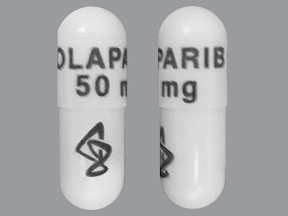OLAPARIB CAPSULE - ORAL
PHONETIC PRONUNCIATION: (oh-LAP-a-rib)
COMMON BRAND NAME(S): Lynparza
GENERIC NAME(S): olaparib
Uses
USES: This medication is used to treat ovarian cancer. It is a chemotherapy drug that works by slowing the growth of cancer cells.
How to use OLAPARIB CAPSULE - ORAL
HOW TO USE: Read the Medication Guide provided by your pharmacist before you start taking olaparib and each time you get a refill. If you have any questions, ask your doctor or pharmacist. This medication also comes in a tablet form. Do not take the tablet form in place of the capsules unless your doctor tells you to do so. They do not work the same way. Ask your doctor for details. Take this medication by mouth with or without food as directed by your doctor, usually twice daily. Swallow the capsules whole. Do not chew, dissolve, or open the capsules. Do not take capsules that look damaged or look like they have leaked. Avoid eating grapefruit or drinking grapefruit juice while using this medication unless your doctor or pharmacist says you may do so safely. Also avoid eating Seville oranges (often found in marmalade). Grapefruit and Seville oranges can increase the chance of side effects with this medicine. Ask your doctor or pharmacist for more details. The dosage is based on your medical condition and response to treatment. Do not increase your dose or use this drug more often or for longer than prescribed. Your condition will not improve any faster, and your risk of serious side effects will increase. Since this drug can be absorbed through the skin and lungs and may harm an unborn baby, women who are pregnant or who may become pregnant should not handle this medication or breathe the dust from the capsules.
Side Effects
Precautions
Interactions
Overdose
Images
Reviews
Faq for OLAPARIB CAPSULE - ORAL
Olaparib capsule is used to treat certain types of ovarian cancer and breast cancer in patients who have certain inherited genetic mutations.
Olaparib is a PARP inhibitor, which means it blocks an enzyme called poly ADP-ribose polymerase (PARP). This enzyme helps repair damaged DNA in cells. By inhibiting PARP, Olaparib prevents cancer cells from repairing themselves, leading to their death.
Olaparib capsule should be taken as directed by your healthcare provider. It is usually taken twice daily with or without food. Swallow the whole capsule with water, and do not open, crush, or chew it.
Common side effects of Olaparib capsule may include nausea, vomiting, diarrhea, fatigue, loss of appetite, and decreased blood cell counts. It is important to report any severe or persistent side effects to your doctor.
Yes, there are some precautions and warnings. Olaparib may cause serious side effects such as bone marrow suppression, which can lead to low blood cell counts. It may also increase the risk of developing certain types of cancers. You should inform your healthcare provider about any other medications you are taking and any medical conditions you have before starting Olaparib treatment.
No, Olaparib is not recommended during pregnancy or while breastfeeding. It may cause harm to the fetus or the newborn. It is important to discuss your options with your healthcare provider if you are pregnant or breastfeeding.
The duration of Olaparib treatment may vary depending on your specific condition and response to the medication. Your doctor will determine the appropriate length of treatment for you.
It is generally recommended to avoid or limit alcohol consumption while taking Olaparib. Alcohol may increase the risk of side effects and may interfere with the effectiveness of the medication.
Olaparib capsule is not a cure for cancer, but it can help control the growth of tumors and potentially extend survival in patients with certain types of cancer. It is important to follow your doctor's instructions and continue with regular check-ups and monitoring during treatment.
Disclaimer
IMPORTANT: HOW TO USE THIS INFORMATION: This is a summary and does NOT have all possible information about this product. This information does not assure that this product is safe, effective, or appropriate for you. This information is not individual medical advice and does not substitute for the advice of your health care professional. Always ask your health care professional for complete information about this product and your specific health needs.

No Reviews Yet